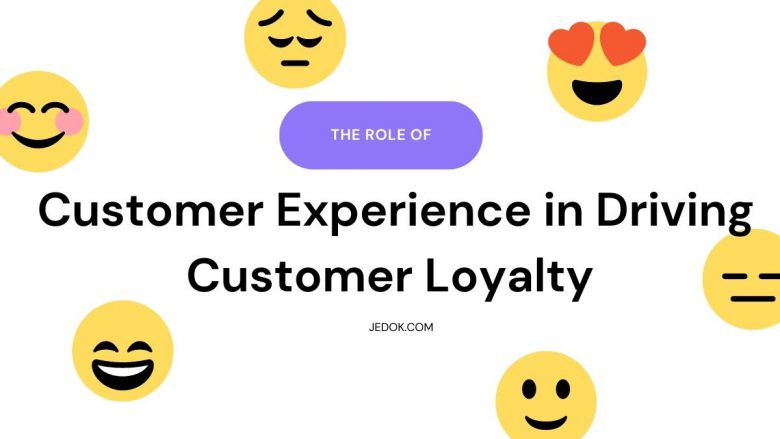
In today’s highly competitive marketplace, customer experience (CX) has become a key differentiator for businesses. CX refers to the overall experience that customers have with a brand, from their initial contact with the brand to post-purchase support. A positive CX can drive customer loyalty and ultimately, business success. In this blog post, we will explore the role of customer experience in driving customer loyalty.
1. Understanding Customer Needs:
Understanding customer needs is essential for any business to succeed. Companies must be able to identify and understand the needs of their customers to create a positive customer experience. Without understanding what their customers want, businesses run the risk of losing loyal customers and weakening relationships with potential ones.
The role of customer experience is critical as it can directly impact consumer loyalty. Every interaction between a business and its customers should provide a positive feeling, which can lead to repeat purchases or referrals that add value to the company. By investing in understanding consumer needs, companies can craft experiences that align with the expectations of their target market, ensuring continued success and growth.
A clear understanding of customer needs allows businesses to create services, products, processes, and more that are tailored specifically for them. This helps build trust within their user base as well as foster brand loyalty when done correctly.
2. Personalization:
Personalization is an important aspect of customer experience. It plays a pivotal role in the level of customer loyalty and satisfaction, which is crucial for any business’s success. Customers want to feel valued and appreciated, which is why personalization is often seen as one way to make them more likely to purchase from a company again. Personalization can take many shapes: customized messages, tailored product recommendations, or even personalized discounts. Companies should strive to create an individual experience for each customer, as it helps build trust and create loyal customers that will come back time and time again.
Having a personalized platform in place increases engagement with customers by making them feel like their needs are being met on an individual level. This allows businesses to strengthen relationships with customers while also creating opportunities to build trust and loyalty over time.
3. Communication:
Providing a positive customer experience can be a challenge for many businesses, but communication is key. Businesses must be responsive to customer inquiries and provide timely responses to create the best customer experience possible. Without the right communication, customers may find it difficult to trust a company and build loyalty.
Good customer service requires more than just responding quickly; it means being available, engaged, and proactive in addressing customers’ needs. Companies must understand the role of customer experience when building relationships with their customers. This involves understanding who their customers are and what they need as well as providing clear communication on products/services offered by the company. Customers should also receive personalized attention when they contact a business so that they feel valued by their provider.
4. Consistency:
Consistency is key when it comes to delivering a positive customer experience. Companies need to ensure that customers are receiving the same level of service each time they interact with them, to build customer loyalty and foster an ongoing relationship. Customers want to feel like they can rely on your business for consistent experiences, and if they don’t get that, they’ll find another company that will offer them the same.
Providing customers with a consistent experience is not only important for achieving customer satisfaction but also ensures trust in your brand. A good customer experience should involve seamless interactions across all channels – from online shopping to contact center support – and should be tailored specifically to each individual’s needs. Furthermore, by maintaining consistency throughout their interaction with you as a business, customers will be more likely to form an emotional connection with your brand.
5. Post-Purchase Support:
Post-purchase support is a critical component of customer experience and plays an integral role in customer loyalty. Customers want to know that they can rely on a brand even after the purchase has been made, so providing them with ongoing post-purchase support is essential. A great post-purchase experience can make customers feel valued, appreciated, and loyal to the brand.
This kind of support is more than just dealing with returns or refunds; it includes helping customers find answers to their questions, addressing any concerns they may have, and providing helpful advice when needed. Post-purchase support should be tailored to each individual customer’s needs and wants, as this will ensure that they receive the best possible service. This could include follow-up emails asking how their purchase went or offering additional services like installation or assembly help.
6. Feedback:
Feedback from customers is a valuable tool for businesses to improve their customer experience. Customers have the opportunity to provide honest feedback about their experiences, allowing businesses to make changes that will improve the overall satisfaction and loyalty of their customer base. Businesses should actively seek out feedback from customers to receive real-time information on how they can best serve their customers. This can include surveys, reviews, interviews, or even monitoring social media conversations.
By taking the time to listen and understand customer needs and preferences, businesses can create a better customer experience which leads to improved customer loyalty. Listening to customer feedback helps create a stronger connection between businesses and consumers as well as develop new ways of understanding what products or services are most desired by customers so that companies can adjust accordingly.
Conclusion
Customer experience is a key driver of customer loyalty. By understanding customer needs, personalizing the customer experience, communicating effectively, providing consistency, offering post-purchase support, and soliciting feedback, businesses can create a positive customer experience that drives customer loyalty and business success.


